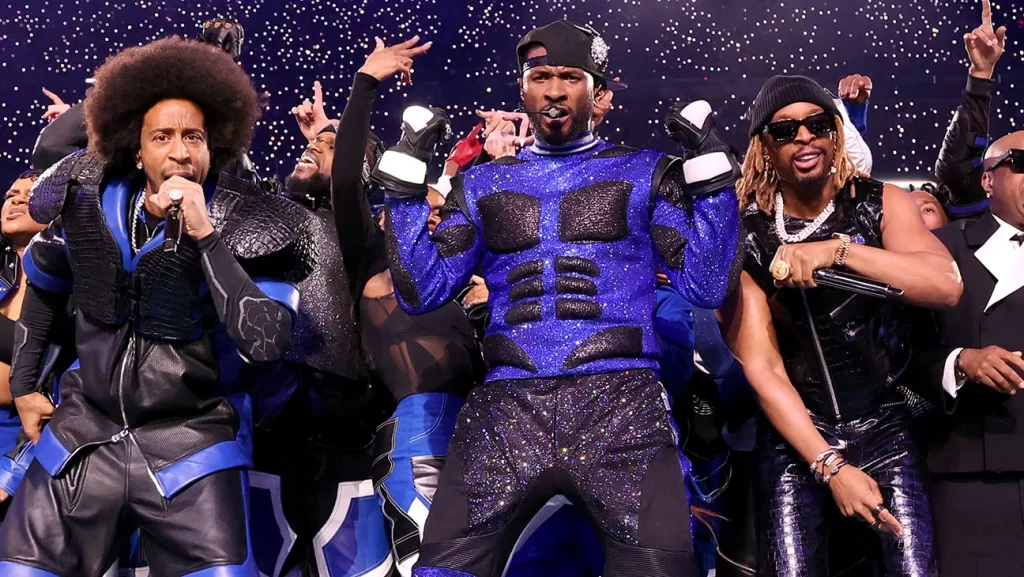Even though the San Francisco 49ers lost 22-25 to the Kansas City Chiefs in Super Bowl 58 on Sunday in Las Vegas, gold was still struck. The rush didn’t come from the 60 minutes of gameplay but from Usher’s 13-minute halftime performance.
Sure, Kendrick Lamar, Dr. Dre, and crew brought the streets and Black culture to Super Bowl 56 with their halftime performance, but Usher’s MJ-esque charisma and swift moves were needed now. Get what I did there.
During Super Bowl media week, a reporter asked Niners cornerback Charvarius Ward if he listened to Taylor Swift before games. He quickly dismissed the question. However, when another reporter asked him about Usher songs, a smile absorbed his face, and he couldn’t stop naming them. Ward connected with Usher because Usher is one of his own. Usher is 56.4 percent of the NFL’s racial demographic among players but zero percent among majority owners.
Seeing Usher perform on the field for the first few minutes with his background dancers lacking uniformity, I expected a performance without structure. The songs weren’t the concern; the execution was. This is a striking parallel to the dilemma facing the nine Black head coaches in the NFL.
Usher wasn’t just performing; he was an illuminated vessel reminding the NFL of the culture that reflects the majority demographic. Akin to the nine coaches, if he failed to execute, the owners would have a reason to ignorantly disregard Black excellence once again.
But, then. Then he came off the field and hit the stage. Then, oh then, came Alicia Keys.
“If I ain’t got you” smoothly transitioned into “My Boo,” and Usher probably got Swiss Beatz mad when he wrapped his arms around Alicia.
The camera cuts following their embrace. The crowd hears So So Def Recordings founder Jermaine Dupri say, “It’s rare you find people like us,” before he leads the crowd in moving their hands along to “Confessions.”
Dupri’s statement is critical in a league where, 35 years after its first Black head coach, the most number of Black people in that position for one season is nine. That season happens to be the upcoming one. So, yes, it is rare.
The league never had to confess to deliberately refusing to hire Black head coaches. History brings their sins to the altar for them. The Washington Post states, “Just 11 percent of full-time head coaches since 1990 have been Black. During that time, 154 White men have served as an NFL head coach, compared with 20 Black men.”
As for any excuses for that harsh reality, paying homage to this year’s halftime performer, just let ’em burn because the NFL truly got it bad.
After Usher sang a few more hit songs, H.E.R. rattled the crowd with an exquisite electric guitar act before the main performer roller skated back on stage in a blue-dazzled outfit. At this point, imagining my older cousins in a disco hall in the early 2000s grooving to Usher made me jealous.
But the envy quickly dissipated as my eyes glanced at Usher’s chrome Jordan 4s and noticed a tribute to legendary drummer Aaron Spears. The culture was on full display.
A record breaking 202 million people saw Kappa Alpha Psi groove with Usher as the Jackson State marching band made an HBCU stamp for the most watched Super Bowl of all time.
No, there was no Justin Bieber, like everyone wanted, but it’s okay because it’s what those pioneering for Black empowerment in the NFL needed.
For 13 minutes, it’s like I was watching a club scene with Howard University students in 2002 when Washington was “chocolate city.” Then things became more modern when Lil John performed his classic, “Turn Down for What.” Modern lasted only a short time, however. Ludacris popped in with a 70s-style afro and helped lead “Yeah.” Indeed, Chiefs players felt relieved in the locker room- certainly quarterback Patrick
Mahomes did. Look at the game sequence.
Mahomes had a subpar first half. Usher performed. All Chiefs haters, including myself, are then reminded why they hate Mahomes. Usher brought the predominantly Black celebrities at the game and players on the field back to the ‘90s and early ‘00s. Most importantly, he brought A-town, or Atlanta, not the suburb part, but the streets to the NFL owner’s favorite playground- the Super Bowl.
His performance reminded the NFL of the great paradox that exposes the beauty of Black culture. Transcendently impactful yet presently powerful. A reminder that may also propel Black players and coaches in the NFL to confidently and boldly defend and radiate the culture’s trials and triumphs despite resistance and authoritative displeasure from the owners.


